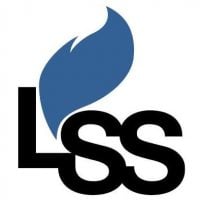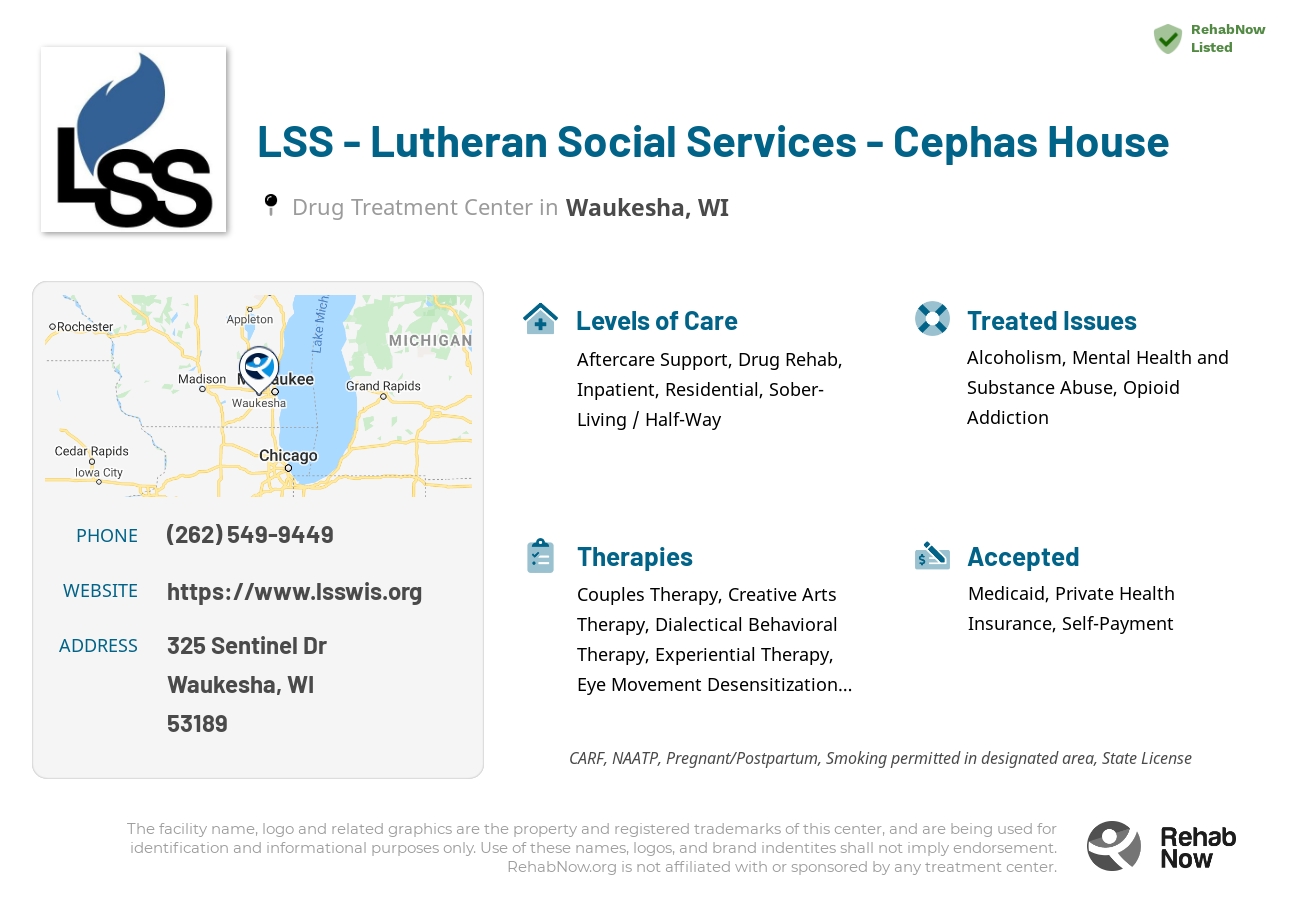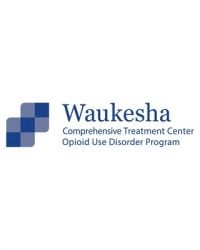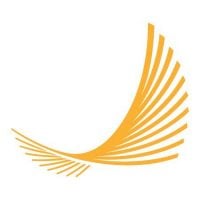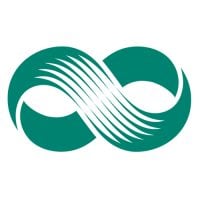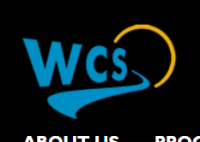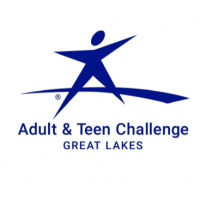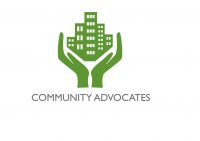LSS - Lutheran Social Services - Cephas House
Drug Rehab Center in Waukesha, Wisconsin
LSS - Lutheran Social Services - Cephas House is a 14 bed facility in Waukesha, WI that provides a variety of substance abuse treatment services, including inpatient, residential, and sober-living/half-way levels of care, as well as aftercare support and drug rehab, tailored to individual needs and accepting private health insurance.
About This Wisconsin Facility
LSS - Lutheran Social Services - Cephas House is a drug treatment facility located in Waukesha, Wisconsin. Founded by Lutheran Social Services, this facility specializes in helping individuals struggling with alcoholism, opioid addiction, dual diagnosis, and drug addiction. The facility offers various levels of care including aftercare support, drug rehab, inpatient, residential, and sober-living/half-way programs. LSS - Lutheran Social Services - Cephas House is equipped to accommodate up to 14 individuals seeking recovery from substance abuse. They also accept private health insurance, providing a financial option for those in need.
At LSS - Lutheran Social Services - Cephas House, individuals receive comprehensive treatment for addiction and substance abuse. The facility utilizes various treatment methods and services to aid individuals towards recovery. With a focus on treating alcoholism and opioid addiction as well as a dual diagnosis of mental health issues accompanied by addiction, the facility strives to address the interconnected nature of these challenges for individuals seeking help. Treatment may involve therapy sessions, counseling, peer support groups or AA/NA meetings to foster holistic healing and long-term sobriety. With different levels of care available onsite, LSS - Lutheran Social Services - Cephas House provides tailored treatment plans to suit individual needs on their journey toward recovery from addiction and substance abuse.
Genders
Ages
Modality
Additional
Conditions and Issues Treated
Opioid addiction is the result of repeated use, or abuse, of opioid drugs. It is recommended for people who are dependent on opioids, or who have a high risk for dangerous health concerns, to seek professional treatment. Treatment plans usually include behavioral therapy and medication-assisted treatment.
Opioid drugs include: fentanyl, heroin, methadone, oxycodone, and oxymorphone.
Opioid addiction treatment is beneficial for:
- People who have a history of severe withdrawal.
- People with a high risk for dangerous health concerns.
- People having difficulty overcoming opioid addiction on their own.
Levels of Care Offered at LSS - Lutheran Social Services - Cephas House
This center offers a variety of custom treatment tailored to individual recovery. Currently available are Aftercare Support, Drug Rehab, Inpatient, Residential, Sober-Living / Half-Way, with additional therapies available as listed below.
Inpatient treatment is the most intensive level of care, and it’s necessary for those who aren’t able to control their addiction. These patients also must be drug-free before attending inpatient programs .
During inpatient treatment, addicts live at an inpatient facility 24 hours a day while receiving help. This type of program is generally recommended for those who need to go through detoxification or who are struggling with serious addiction-related issues.
A Sober Living Home (SLH) is a term used to describe houses where people recovering from addiction can stay. The goal of these places is to provide immediate support and protection that the addict needs and force them to live a life free from substance abuse. SLH’s typically allow the addict to live there for 30, 60, or 90 days.
Residential treatment programs are those that offer housing and meals in addition to substance abuse treatment. Rehab facilities that offer residential treatment allow patients to focus solely on recovery, in an environment totally separate from their lives. Some rehab centers specialize in short-term residential treatment (a few days to a week or two), while others solely provide treatment on a long-term basis (several weeks to months). Some offer both, and tailor treatment to the patient’s individual requirements.
Aftercare support is a service many addicts need to ensure their success at recovery. This service usually includes one-on-one or group therapies, assistance from a sponsor and other types of help designed to make sure the patient continues living a life free from drugs.
Patients also may require medication to help them battle addiction. Some people have been able to successfully recover without additional medications, but others have found that they need help during their transition. Long-term, the patient must take the initiative to attend meetings and receive help from other addicts in recovery.
Therapies & Programs
People in addiction recovery can benefit from individual therapy. This type of therapy involves meeting with a therapist one-on-one. This allows for a personal and trusting relationship to be built so that the patient can be truly themselves and express any emotions they feel. Individual therapy leads to greater understanding and peace about your triggers for addiction and coping strategies to prevent relapse.
Couples therapy for drug addiction is based on the belief that addiction is a family disease. Everyone involved with an addict, not just the addict themselves, is affected by their behavior and the changes the addict goes through. The relationship also changes the addict’s significant other and has likely picked up some codependent behaviors. Codependency is a term used to describe a person obsessed with another person and their needs and feelings while neglecting their own. Addicts are usually people-pleasers, so it is understandable how one can become codependent in relationships with addicts.
Family therapy is a type of group problem-solving that aims to improve communication and relationships between the patient, their family, and sometimes friends. The main goal of family therapy for drug addiction is to create an environment where communication can occur without judgment, hostility, or blame. The therapist is with the family as they learn to communicate with each other differently, especially with the addict when s/he is using.
Group therapy sessions are held in rehab facilities, clinics, churches or community centers that offer drug addiction treatment. People who attend these groups are encouraged to voice their feelings and support other addicts in recovery. This helps group members strengthen their own recovery program while cheering on others who are struggling with sobriety.
Group therapy sessions provide recovering addicts with a chance to cope with everyday situations that many face. Group therapy sessions are held in rehab facilities, clinics, churches or community centers that offer drug addiction treatment.
People who attend these groups are encouraged to voice their feelings and support other addicts in recovery. This helps group members strengthen their own recovery program while cheering on others who are struggling with sobriety.
If you’re looking for addiction treatment, it’s important to find a facility that offers trauma therapy. This type of therapy helps people process and understand the past traumas that have led to their addiction. Trauma therapists will work with clients to help them understand their past and present relationships and show them that they are worthy of love. This therapy is typically done using visualization, discussion, and writing down thoughts and feelings.
Trauma Therapy is a form of therapy that involves working with a patient to help them process and understand the past trauma(s) in their life. This therapy is typically done using techniques such as visualization, discussion, and writing down thoughts and feelings. The main goals of trauma therapy is to help clients express their emotions and talk about what they are feeling.
Dialectical Behavior Therapy (DBT) is a form of cognitive-behavioral therapy that helps people understand how they connect their thoughts, behaviors, and feelings. It can give them more control over their actions, effectively stopping self-harm ideations and attempts in some patients. It also helps put those with borderline personality disorder into control for managing mental struggles.
A new study has shown that DBT works for those with self-harm behaviors and addictions by giving them therapy they can relate to and understand.
Cognitive Behavioral Therapy (CBT) helps addicts identify faulty, negative thinking so that they can work together with the therapist to find healthier ways of thinking. CBT focuses on specific aspects of each person’s thinking, feeling, physiology, and behavior. It aims to identify specific problems in these areas, and create a personalized treatment strategy.
Eye Movement Desensitization and Reprocessing (EMDR) is an integrative psychotherapy approach that has been extensively studied and proven effective for treating trauma. EMDR sessions typically last 50-90 minutes and can be completed in as little as 12-15 sessions. EMDR is a goal-directed therapy in which the client works with the therapist to develop an individualized treatment plan that focuses on specific trauma memories and associated disturbance.
Life Skills Services offered at LSS - Lutheran Social Services - Cephas House assists addicts in their recovery by teaching them healthy coping mechanisms that will aid them in becoming sober, focussing on helping people enter into, and maintaining long-term sobriety. LSS - Lutheran Social Services - Cephas House provide Life Skills Services at varying levels of intensity, specific to the needs and requirements of each patient.
Benefits of Life Skills Services offered at Drug Treatment Centers in Wisconsin:
- Restores hope and empowerment — Helps addicts believe that recovery is possible and instills a new confidence in their ability to achieve a positive, drug-free future
- Enhances family involvement — Encourages families to get involved in the recovery process and supports their understanding and encouragement of healthy behavior.
- Increases patient’s compliance — Helps patients take responsibility for and ownership of their recovery and encourages continued progress
- Reduces relapse rates — Encourages long-term abstinence and emphasizes the importance of establishing sober support systems.
Patient Experience
Creative Arts
Creative Arts Therapy is a treatment method for patients of LSS - Lutheran Social Services - Cephas House in Waukesha, Wisconsin who are victims of addiction to drugs, alcohol, or other substances. Group Creative Arts Therapy sessions help addicts get sober by allowing them to meet and talk with peers who are going through the same problems. This builds trust and helps addicts understand that they are not alone. Depending on the severity of the patient’s drug or alcohol problem, they may attend group creative art therapy sessions or individual sessions.Experiential Therapy at LSS - Lutheran Social Services - Cephas House
Experiential Therapy allows addicts to release emotions in a safe environment. The process involves addicts painting their feelings and releasing them on a canvas. LPE – Love, Peace, and Equilibrium is one of the most popular forms of experiential therapy.
Payment Options Accepted
For specific insurance or payment methods please contact us.
Is your insurance accepted?
Ask an expert, call (888) 674-0062
Lutheran Social Services – WI Associated Centers
Discover treatment facilities under the same provider.
- LSS - Lutheran Social Services - Exodus House in Hudson, WI
- LSS - Lutheran Social Services - Community Transition Center in Eau Claire, WI
- LSS - Lutheran Social Services - Dodge County Group Home in Beaver Dam, WI
- Lutheran Social Services - Eau Claire in Eau Claire, WI
- LSS - Lutheran Social Services - Wazee House in Black River Falls, WI
Learn More About Lutheran Social Services – WI Centers
Additional Details
Specifics, location, and helpful extra information.
Waukesha, Wisconsin 53189 Phone Number(262) 549-9449 Meta DetailsUpdated November 25, 2023
Staff Verified
Patient Reviews
There are no reviews yet. Be the first one to write one.
Waukesha, Wisconsin Addiction Information
Wisconsin has some of the highest rates in the United States for both adolescent and adult substance abuse. Since 2009, the state has been experiencing the same escalating rates of drug abuse and addiction as the rest of the country. The major concerns are the misuse of prescription painkillers and the escalating number of deaths due to alcohol-related liver disease.
The drug addiction problem in Waukesha, Wisconsin, is fairly bad. Around 9.4% of people in Waukesha, WI, abuse drugs, and around 5.6% abuse alcohol. Drug addiction can lead to criminal activity, job loss, financial instability, and social isolation. The most common types of treatment available in Waukesha, Wisconsin, are inpatient, outpatient, and residential.
Treatment in Nearby Cities
- Brookfield, WI (8.5 mi.)
- Lancaster, WI (125.8 mi.)
- Kewaunee, WI (108.6 mi.)
- Osceola, WI (274.6 mi.)
- Stevens Point, WI (126.0 mi.)
Centers near LSS - Lutheran Social Services - Cephas House
The facility name, logo and brand are the property and registered trademarks of LSS - Lutheran Social Services - Cephas House, and are being used for identification and informational purposes only. Use of these names, logos and brands shall not imply endorsement. RehabNow.org is not affiliated with or sponsored by LSS - Lutheran Social Services - Cephas House.
